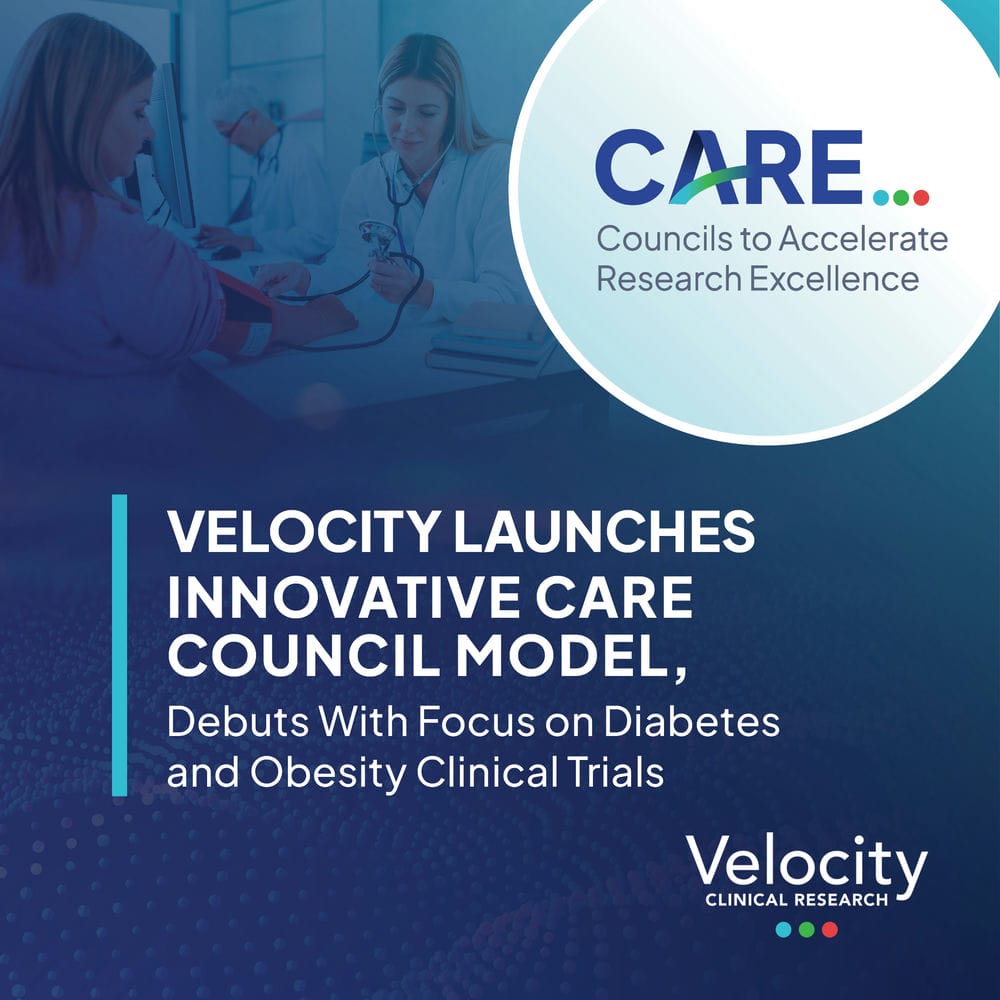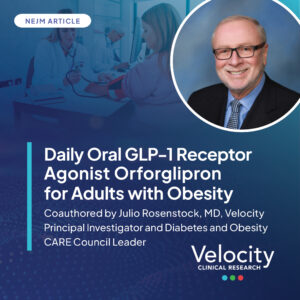Velocity has conducted trials that have led to 20+ product approvals for diabetes, obesity, and dyslipidemia
The Velocity Diabetes and Obesity Council to Accelerate Research Excellence (CARE) develops best practices to guide recruitment, screening, trial conduct, and retention strategies for all Velocity sites. This council is led by experts with extensive research and medical practice experience, along with veteran operational leaders.
Given the high prevalence of obesity (40%+) and diabetes (11%+) among U.S. adults, these diseases represent a growing therapeutic need, particularly as children become increasingly affected by these diseases. While afflicted populations are large, the diversity of concurrent therapies and lifestyle considerations can quickly complicate clinical trial design, screening, and enrollment.
Reach and capabilities
- 10+ sites with extensive diabetes and obesity capabilities
- On-site dietitians at key sites
- Access to millions of patient lives
- World-class diversity and community engagement initiatives
- Expertise in diabetes-related device research, including continuous glucose monitoring
Diabetes and Obesity CARE Council Leaders
Velocity's Diabetes and Obesity CARE Council is led by distinguished physicians, and leverages their vast experience in diabetes and metabolism-related research, alongside Velocity sites and staff that have supported thousands of trials and offer access to millions of patient lives.

Gregg Lucksinger, MD
A seasoned Principal Investigator with longstanding experience in obesity and diabetes research, Dr. Lucksinger has been at the forefront of clinical trials since cofounding a research site adjacent to his family medicine clinic in 1999. In 2020, he joined Velocity as a medical director and continues to advance research in metabolic health challenges, focusing on innovative treatments for obesity, diabetes, hyperlipidemia, and hypertension. He specializes in overseeing high-volume studies and has supported more than 200 Phase 1-3 trials. Dr. Lucksinger earned his medical degree at the UT Health Science Center at San Antonio and completed a residency at the UT Austin Dell Medical School.

Sarah Smiley, DO, FACP
A medical director and Principal Investigator, Dr. Smiley has been deeply involved in clinical trials since 2007. Her research spans obesity, diabetes, and endocrinology, as well as related areas such as cardiovascular and pulmonary diseases, gastrointestinal issues, and rheumatologic conditions. Dr. Smiley holds dual board certifications in internal medicine and hospice and palliative medicine, and has specialized training in pain management. With experience in medical group and regulatory management, she also excels in advancing clinical research operations. Dr. Smiley graduated from the UNT Health Science Center and completed a residency at the UT Austin Dell Medical School.
Additional CARE Council Leaders
Kate Crawford, NP-C
Anna VanderHeiden, MD
Allison Camacho
In the News
Julio Rosenstock, MD, FACE, Principal Investigator at Velocity and the leader of the Diabetes and Obesity CARE Council, unveiled data suggesting a potential breakthrough for adults with prediabetes. When administered oral semaglutide, trial participants achieved normoglycemia at 68 weeks. Dr. Rosenstock commented, “Those people who participated in the OASIS 1 trial with prediabetes who received oral semaglutide experienced more HbA1c normalization and none progressed to type 2 diabetes.” Furthermore, the same group of adults with prediabetes lost an impressive 14.4% … Read more
Another positive step in obesity research: Julio Rosenstock, MD, is a co-author of an article now featured on The New England Journal of Medicine homepage, and in the publication’s weekend email briefing. From the article, Daily Oral GLP-1 Receptor Agonist Orforglipron for Adults with Obesity: “At week 26, the mean change from baseline in body weight ranged from −8.6% to −12.6% across the orforglipron dose cohorts and was −2.0% in the placebo group. At week 36, the mean change ranged … Read more
Julio Rosenstock, MD, has his work spotlighted as the feature article on the New England Journal of Medicine’s homepage. Serving as the lead investigator for Novo Nordisk’s ONWARDS 1 program, Dr. Rosenstock has made remarkable strides in exploring what could be the world’s first once-weekly basal insulin. “In ONWARDS 1, insulin icodec allowed people to spend significantly more Time in Range, with comparable Time below Range vs. once-daily basal insulin glargine U100,” said Dr. Rosenstock. “A once-weekly basal insulin has … Read more






